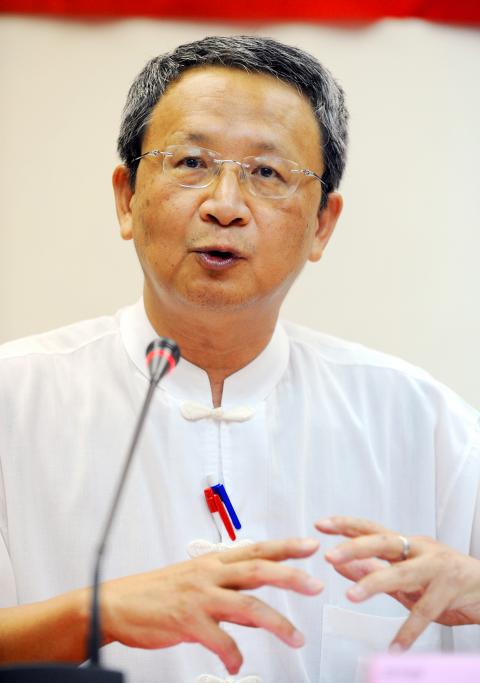|
DPP criticizes
academic¡¦s 228 Massacre study
228 TUMULT: Chu Hung-yuan has a history of
making controversial statements on the 228 Incident. In 2007, he said the
Japanese colonial government was to blame
By Shih Hsiu-chuan / Staff reporter

Chu Hung-yuan, a research fellow
at Academia Sinica¡¦s Institute of Modern History, is pictured on Sept. 5, 2009.
Photo: Lo Pei-der, Taipei Times
Democratic Progressive Party (DPP)
lawmakers yesterday criticized a government-sponsored study of the 228 Massacre
in 1947 that blamed the Presbyterian Church for the riot, whitewashing the
responsibility of Chiang Kai-shek¡¦s (½±¤¶¥Û) regime.
The study conducted by Chu Hung-yuan (¦¶ÒG·½), a research fellow at Academia
Sinica¡¦s Institute of Modern History, received a grant of NT$500,000 from the
government-affiliated Taiwan Foundation for Democracy, part of the
organization¡¦s regular sponsorships of academic studies.
In its defense, Taiwan Foundation for Democracy chief executive Huang Teh-fu
(¶À¼wºÖ) said Chu¡¦s study represented his personal views and that it was not the
position of the organization because it was a grant-maintained study rather than
a project undertaken by the organization.
Chu published his research in November last year in Washington and said he had
made five breakthroughs.
The first was the use of personal testimony by Hsu Hsueh-chi (³\³·®V) and other
researchers, which the Research Report on the 228 Incident published by the
Executive Yuan in 1992 was based on, was likely to include ¡§unnecessary
emotion.¡¨ The second was the key role of the underground Chinese Communist
Party. The third was the intervention of ¡§hawkish¡¨ figures from the US. The
fourth was the exceptionally small number of military personnel stationed in
Taiwan at the time and the fifth was the Presbyterian Church¡¦s ¡§wide
participation in the attacks.¡¨
Huang was bombarded with questions from DPP lawmakers regarding the study at a
meeting of the legislature¡¦s Foreign Affairs and National Defense Committee.
¡§How could you not know what role the Presbyterian Church played in the
democratization process in the country? Chu admitted that he wasn¡¦t able to
access the Presbyterian Church¡¦s files. Given that, how could he come to the
conclusion he did?¡¨ DPP Legislator Hsiao Bi-khim (¿½¬üµ^) asked.
Huang said the conclusion was also ¡§to our regret,¡¨ adding that the foundation
would upload the research online so that it could be subject to scrutiny.
DPP Legislator Tsai Huang-liang (½²·×·ã) said Chu¡¦s research distorted the facts of
the incident and that it could cause serious damage to families of the victims
of the incident, creating confrontation between Taiwanese and Mainlanders.
¡§The research is unacceptable. It attributed the uprising to incitement
initiated by the Presbyterian Church and local ruffians and to infiltration by
the Chinese Communist Party. Even former president Lee Teng-hui (§õµn½÷) was an
instigator. How can we accept such baseless conclusions?¡¨ Tsai asked.
Citing an example of the so-called ¡§new findings¡¨ in Chu¡¦s research, Tsai noted
an incident whereby a group led by the Presbyterian Church attacked Mainlanders
in Changhua County and robbed their textile factory.
¡§Is this true? Did people see the Presbyterian Church lead the killers? Why
haven¡¦t we seen similar descriptions in previous research?¡¨ he asked.
Chu has a history of causing controversy when commenting on the 228 Incident.
In 2007, he said the Japanese colonial government was to blame for the violence,
rather than Chiang, because the Japanese deliberately created inflation before
they handed Taiwan over to the Chinese Nationalist Party (KMT) to provoke public
resentment of Chiang¡¦s regime.
The 228 Incident was a Japanese ¡§premeditated economic attack¡¨ on Taiwan, Chu
said, adding that the US was complicit in the 228 Incident because it had
planned to bring Taiwan under its mandate.
|
![]()
![]()
![]()